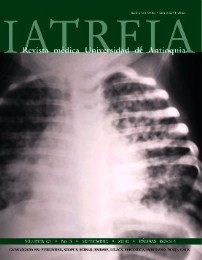Gastrointestinal stromal tumors (GIST): Role of the surgeon in the molecular medicine era
DOI:
https://doi.org/10.17533/udea.iatreia.8456Keywords:
GIST, Imatinib mesylate, Laparoscopic surgery, Gastrointestinal stromal tumorsAbstract
Gastrointestinal stromal tumors (GISTs) are a group of non-epithelial neoplasms that affect the gastrointestinal tract and the mesentery. They are characterized by specific histological and immunohistochemical patterns. Until 1983 GISTs were mistakenly classified as leiomyomas, leiomyoblastomas, and leiomyosarcomas. In that year Mazur and Clark introduced the term “stromal tumor”. These neoplasms constitute less than 1% of gastrointestinal malignancies and 5% of all sarcomas. Their incidence is 0.68/100.000. It has been demonstrated that GISTs are the result of gain-of-function mutations of c-Kit and PDGFRα protoncogenes. They can appear anywhere from the esophagus to the anus. Clinical manifestations depend on their location and size. Treatment of primary GISTs is surgical but in the advanced stages they may be treated with imatinib mesylate, an effective, molecularly targeted therapy.
Adjuvant and neoadjuvant therapy are a controversial issue. This article is an update on GISTs based on the available literature.
Downloads
Downloads
Published
How to Cite
Issue
Section
License
Papers published in the journal are available for use under the Creative Commons license, specifically Attribution-NonCommercial-ShareAlike 4.0 International.
The papers must be unpublished and sent exclusively to the Journal Iatreia; the author uploading the contribution is required to submit two fully completed formats: article submission and authorship responsibility.














